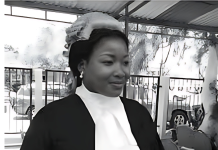By Kebba AF Touray
The National Assembly erupted in debate this week following the forceful removal of Auditor General Modou Ceesay, a move that lawmakers said undermines the constitutional order and raises profound questions about the sanctity of due process.
On Wednesday, September 17, 2025, Hon. Almameh Gibba, the National Assembly Member for Foni Kansala, rose under “matters of the day” to denounce the government’s actions, describing the incident as “an utmost national concern, one that strikes at the very core of our constitutional democracy, institutional integrity and the rule of law.”
The Auditor General was forcibly escorted from his office on September 15, after rejecting a cabinet appointment as Minister of Trade. According to the Information Minister’s account, Ceesay was appointed on September 10 and initially accepted. But the following day, he explicitly declined. The government concluded that “having accepted the appointment, evidence of which has not been substantiated, he is unable to reverse his decision and demanded to remain in his role as the Auditor-General.”
Gibba told lawmakers that police officers from the Office of the Inspector General were deployed to remove him. “This action led to the backlash from certain members of civil society who condemned the decision and expressed their solidarity regretfully. The same law enforcement was employed to unjustly arrest some of these individuals,” he said.
For Gibba, the matter was far larger than an individual dispute. “This is not merely a personal issue; it is a constitutional crisis,” he said. He argued that the action violated both the 1997 Constitution and the National Audit Act of 2015. “The National Audit Office is a cornerstone of transparency, accountability and governance. Undermining its independence weakens our democratic institutions and erodes public trust.”
He warned that the episode raised “critical questions about the separation of power, the independence of audit institutions and the sanity of due process in the Gambia.”
Gibba linked the removal to a wave of arrests. He said that several young citizens, including “Kemo Fatty of Bakau, Alieu Bah of Brusubi, Momodu Camara of Jambanjelly, Omar Saibo Camara of GALA and Bakary Tamba, were reportedly arrested.”
“A journalist from the Gambia Talent Promotion was also briefly arrested but later released after a security screening. Four of those youths remain in custody as of today,” he said.
The arrests, he added, were accompanied by troubling evidence of police tactics. “Eyewitness account footage suggests that tear gas was deployed against unarmed civilians who had gathered peacefully to witness the unfolding event,” Gibba told the chamber.
“This is deeply concerning. In a democratic state governed by the rule of law, citizens must be allowed to exercise their right to peacefully assemble and express themselves without fear of repression or arbitrary arrest,” he said. “The use of force to suppress civic engagement undermines our democratic values and violates the principles of human rights.”
Gibba concluded with an appeal to his fellow lawmakers. “This is a moment for Parliament to demonstrate courage, foresight and unwavering commitment to the principles of good governance. And let us not allow silence or inaction to legitimise the illegality,” he said. “Let us speak with one voice to determine the constitution and to protect our institutions. And to reassure the Gambian people that this Assembly remains a guardian of their rights and freedoms.”
Not all lawmakers shared his view. Nominated member Maimuna Ceesay rose to defend President Adama Barrow and cast blame on the Auditor General for mishandling the matter.
“The Presidency is the highest position in the Gambia, and when you have a tet-a-tet with the President, I know he is somebody who relies on people’s opinion,” she said. “He never dictates. President Barrow is someone who never takes a decision on behalf of the people, without thorough consultation.”
She argued that Ceesay had consented to the appointment before reversing course. “Had the President not had the consent of the man, the appointment would not have taken effect, but you sat and discussed the Ministry with the President, and he laid his concerns as to why he wants to deploy you in that Ministry. This is because he has seen a potential in you, where you were delivering at the Audit Office, and because of your expertise, he thought that if I deploy you to the Trade Ministry you can reshape it.”
Maimuna Ceesay said the Auditor General had erred in issuing a public statement. “After giving your consent, you left the office and talked to other people who gave different scenarios. We have to be honest with ourselves, as no man is born with a position,” she said.
She said she was “disappointed with the way Ceesay handled the matter,” suggesting he could have returned to the President privately. “If the man does not humiliate the President by issuing that press statement, he could have written to the President to indicate that he would have preferred to remain as the AG, but for her, the AG cannot humiliate the President by giving a consensus, and later want to change it.”























